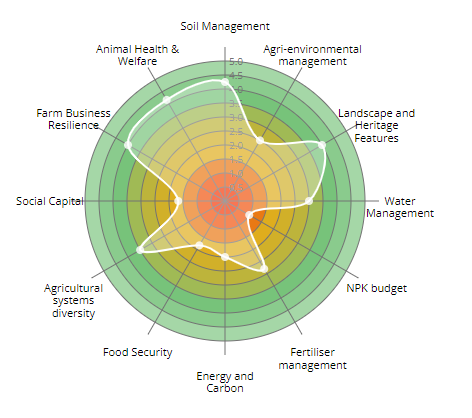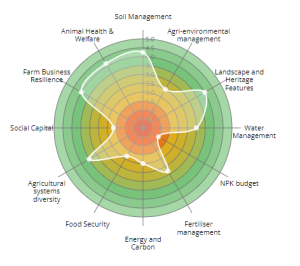Contract Period : 31/03/2011 -
Project Webpage : https://www.organicresearchcentre.com/PG-Tool/
Main Funder : Various
ORC Staff Contact : Christian Gossel


The Public Goods Tool was initially developed as part of the Organic Conversion Information Service (OCIS) in 2011. Designed to capture data about farm practices and represent the sustainability and produce of public goods, the PG Tool has since undergone various iterations and adaptations. Designed to capture data about farm practices, sustainability, and produce of public goods, the PG Tool offers a simple way of visualising the state of the farm in relation to 12 indicators:
The simple design, scoring non-weighted results to various questions and data inputs, allows for a great level of adaptability across a range of scenarios, however, the output is only an overall view of the state of the land management and should be utilised alongside other advice for implementing change.
Nonetheless, the aim of the PG Tool is to provide a useful tool for farmers, land managers, and researchers alike to assess their practices with specific relation to public goods provisioning and overall sustainability.
Following the creation of the tool, it was then utilised and modified for various other projects. in 2012/13 the tool was used in the Sustainable Organic and Low Input Dairying (SOLID) EU project, adapting the tool to capture more dairy-related data and generating assessments on farms across Europe.
Key characteristics for tool choice in indicator-based sustainability assessment at farm level
As the tool was originally created for use in the OCIS, it had a particular focus on organic agriculture. In order to create a more general-use tool, Defra commissioned the adaptation and testing of the PG Tool on 32 conventional farms in 2014.
Evidence Project Final Report Defra OF0398
The EU project Towards Energetic Communities (TWECOM) in 2014/15 further adapted the PG Tool to explore landscape elements, focusing on wood, biomass, and hedges.
A report on adapting the PG tool to incorporate management of landscape elements for woodfuel
From 2013 to 2015, with support from Ekhagastiftelsen, ORC and the Research Institute of Organic Agriculture (FiBL) assessed PG Tool and other sustainability assessment tools in their coverage of the FAO Sustainability Assessment of Food and Agriculture systems (SAFA) framework.
As part of the Sustainable Intensification Project (SIP) the PG Tool was considered alongside other tools for identifying the indicators that are useful when assessing farms for sustainable intensification.
Sustainable Intensification Platform (1) Integrated Farm Management – LM0201
The EU-funded iSAGE project started in 2016 and aimed to explore the Innovations for Sustainable Sheep and Goat Production in Europe. An adapted version was once again created and shared with all members for to generate sustainability assessments on various sheep and goat farms across the EU.
Sustainability Assessment of Goat and Sheep Farms: A Comparison between European Countries
Similar to the TWECOM project, from 2016 to 2019 SustainFARM explored the use of woody products in grazing systems. The PG Tool was used to provide an overall assessment of different farm and wood use types.
A Multi-factorial Sustainability Assessment of Five European Agroforestry Farms
The SEEGSLIP project, which finished in 2021, sought to understand the innovations in sustainable economic and ecological grazing systems. To do this members utilised the PG Tool with adaptations for compatibility with Farmbench and Agrecalc.
Pasture-fed production – findings from the SEEGSLIP project
Continuing the role of Defra in creation and support of the PG Tool, the Environment and Land Management Scheme Test & Trials adapted and evaluated the usability of the PG Tool in the future of developing and assessing ELMs.
One year in, one year to go: Assessing Public Good delivery on farm
Organic Research Centre, MVARC (2023). Public Goods Tool Online v3.1. Github. https://github.com/Organicresearchcentre.
The PG Tool has been utilised in a range of scenarios, from assessing the economics and sustainability of dairy farming across Europe to supporting the development of UK farming policy. The adaptability of the PG Tool has proved of great importance to its attractiveness to research projects, while the easy to interpret results are welcomed by its users.
The PG Tool has been adapted in-house by ORC for various research projects, with custom versions of the excel spreadsheet being created with specific questions added in for research topics such as Social impact, Animal welfare, and Woody products among others. A full list can be found in the Deliverables section.
In 2023 ORC collaborated with MVARC (https://mvarc.eu/) for the development of an online version of the PG Tool through the Re-Livestock project. This online version is based upon an existing general use version 3.1 of PG Tool. Following on from this, MVARC and ORC will develop a customised version for use in Re-Livestock, however, the general use version has been made available for open use.
This new version is accessible through the ORC website and the source code is available on Github (https://github.com/Organicresearchcentre/repositories) through the MIT licence. Details on how to use and adapt the PG Tool for other research can be found at the above links.
The development and application of ORC’s Public Goods Tool over the years- Research Digest
TempAg
In 2016 the Flanders Research Institute for Agriculture (ILVO) conducted a literature review on sustainability assessment tools which included PG Tool.
Discerning the stars: characterising the myriad of sustainability assessment methods
FAB Farmers
At the request of the Soil Association, the FAB Farmers EU project used the PG Tool to explore the functional biodiversity of farms in 12 pilot regions across 5 counties from 2018 to 2022.